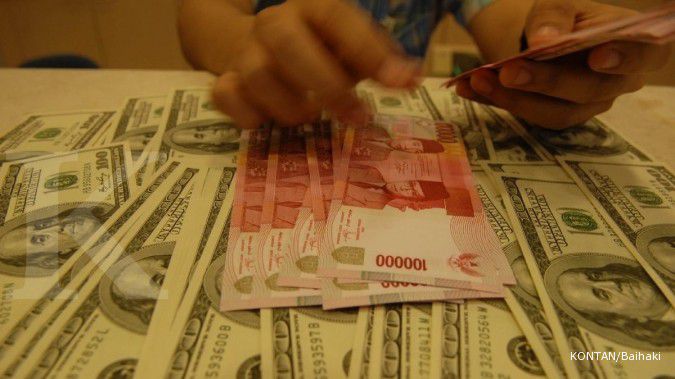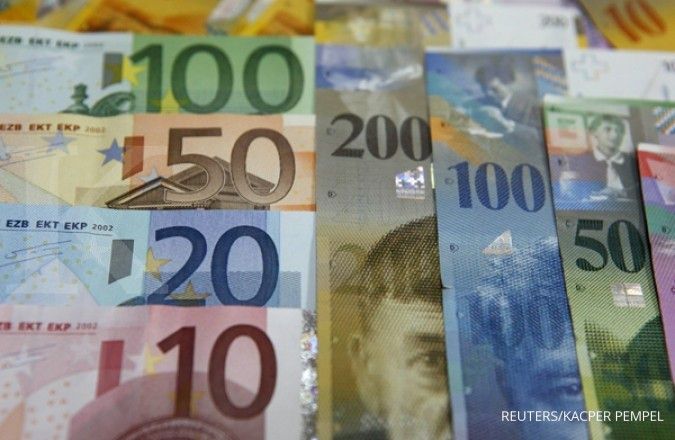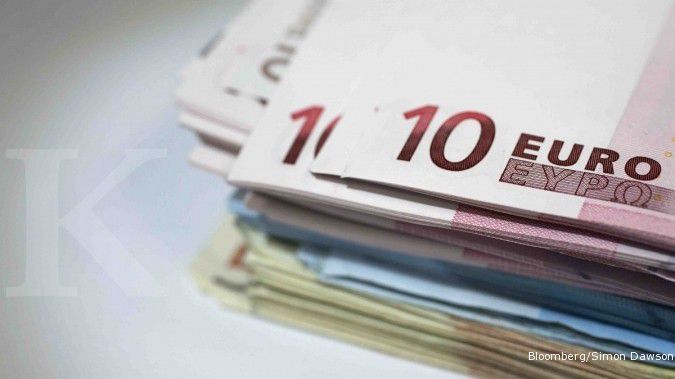JAKARTA. Indonesia’s historic first issue of euro-denominated bonds received a warm welcome from investors with oversubscription during the offering. The government also enjoyed cheaper borrowing costs compared to its regular US dollar bonds.
Indonesia had sold ¤1 billion ($1.36 billion) in eurobonds, in line with its issue target, the Finance Ministry said in a statement on Thursday. Incoming bids from investors topped ¤6.7 billion, which represents almost seven times oversubscription.
The euro-denominated notes have a tenor of seven years and a yield of 2.97 percent, or 195 basis points above the euro mid-swap rate. That compares with the 5.95 percent yield for the 10-year dollar bonds that Indonesia sold in January.
At that time, the yield for the dollar-denominated notes was 296 basis points higher compared to the benchmark US treasuries.
With lower yields in eurobonds than that of the dollar-denominated notes, the Indonesian government has signed up for cheaper borrowing costs for its eurobonds.
“We got good prices due to our strategy of entering the eurobond market when borrowing costs for US dollar bonds have been on the upward trajectory,” Finance Minister Chatib Basri said on Thursday.
“With incoming bids topping ¤6.7 billion, the response from investors was amazing and this shows that they still have very high confidence in Indonesia,” he went on.
“I’ve never seen a seven-time oversubscription in our bonds.”
Rating agencies Moody’s Investors Service and Fitch Ratings rated Indonesia’s eurobonds at their lowest investment grade level, while Standard & Poor’s (S&P) rated them one notch below, or at speculative grade.
Indonesia plans to issue bonds that are denominated in the dollar, euro and Japanese yen this year, in an effort to diversify the source of funds needed to plug the fiscal deficit, which is predicted to soar from 1.7 percent to 2.4 percent in the revised 2014 state budget.
Indonesia regularly depends on dollar bonds for funding, but the government decided to tap other markets this year due to the expected gradual pullback of US monetary stimulus, which could lead to tighter dollar liquidity, a stronger greenback and increasingly expensive borrowing costs.
In addition, European investors have been awash with euros after European Central Bank (ECB) president Mario Draghi flushed the region with additional liquidity through stimulus measures in the form of interest-rate cuts and a banking lending program, announced on June 5.
“From a macroeconomic perspective, the eurobonds are the right instrument to tap the excess liquidity currently available from the ECB’s easing,” said I Made Adi Saputra, a fixed-income analyst with BNI Securities.
Nevertheless, he warned of the risk over currency mismatch in the interest payments of eurobonds, as Indonesia currently had a limited supply of euros in its foreign exchange market due to its undersized trading exposure to countries in the eurozone.
The government could have actually enjoyed even lower borrowing costs had it debuted its eurobonds earlier, especially as the government had floated the idea of the issue since last year, argued Adra Wijasena, a fixed-income analyst with Mega Capital Indonesia.
“Currently, investors already have higher yield expectations due to fears over deflationary threats in European countries, a weaker euro, worsening political crisis in the Ukraine, in addition to the uncertainty of our presidential election,” Adra said Thursday in a phone interview. (Satria Sambijantoro)
Eurobonds sold out as RI reaps low yields
July 04, 2014, 10.53 AM
/2013/09/19/1952288801.jpg)
ILUSTRASI. Serbu! Kode Redeem Tower of Fantasy Terbaru Februari 2023, Klaim 2 yang Baru ini
Source: The Jakarta Post
| Editor: Hendra Gunawan
Latest News
-
March 04, 2026, 05.27 PM
Fitch Cuts Indonesia Credit Rating Outlook to Negative
-
March 03, 2026, 12.18 PM
Indonesia Hopes to Get MSCI Response to Capital Market Reforms Before May
-
March 02, 2026, 04.45 PM
Indonesia has Seized 5 Million Hectares of Palm Oil Plantations, Task Force Says
-
March 02, 2026, 01.10 PM
Asian Assets Slide as Mideast Strikes Spark Oil Spike, Haven Rush
-
March 02, 2026, 10.49 AM
Bank Indonesia Monitoring Market Movements in Response to Conflict in Middle East
-
February 25, 2026, 08.28 PM
Inpex to Solicit Bids for Construction of Indonesia's Abadi LNG Project in Mid-2026
-
February 24, 2026, 03.38 PM
Eni to Reach Final Investment Decision for Indonesia Gas Projects Next Month
-
February 24, 2026, 01.00 PM
Asia Stocks Try to Steady after Wall Street Selloff Sims Mood
-
February 23, 2026, 04.50 PM
Wall Street Futures and Dollar Slide on Trump Tariff Tumult














